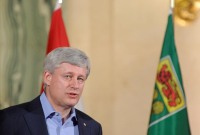Support strong Canadian climate journalism for 2025
ATLANTA — Twelve countries including Canada appeared on the verge of creating the world's largest regional trade zone, which would usher in a series of economic changes on four continents and prompt months of heated debate starting with Canada's election.
After five days of around-the-clock negotiations, an announcement seemed within reach Sunday on the Trans-Pacific Partnership that would cover 40 per cent of the world's economy.
Some national delegations have already begun briefing industry stakeholders on the contents and there are plans for a press conference where the news would become official.
But there's last-minute suspense.
The announcement was pushed back at least three times beyond the afternoon, and into the evening Sunday, as negotiators wrestled with outstanding issues that had already extended these talks several days.
One final tug-of-war involves Canada. Negotiators have been haggling about how much foreign butter, condensed milk and other dairy products should be allowed on Canadian grocery shelves.
The sense of anticipation could be overheard even from people delivering stacks of pizza boxes to the floor at an Atlanta hotel where negotiators have been huddled for days: "It's getting close," one insider said.
The agreement would reduce or eliminate barriers in a wide range of sectors and could lead to more Canadian exports of pork, beef, canola, high-tech machinery and a variety of other products.
It would also entrench new international trade standards in Asia, setting a template should any other countries in that fast-growing region — like China — want to join.
Other parts could be controversial in Canada. It's expected to increase imports of foreign car parts and possibly dairy, which could mean lower prices and greater selection for consumers but also hurt some workers in both sectors.
The United States has apparently agreed to take in more New Zealand dairy, insiders say, but it expects its North American neighbours to absorb some of the impact on its producers by taking in more U.S. dairy, too.
Cue the political debates.
The deal must be ratified in national parliaments, and the NDP's recent opposition to the TPP process is an early example of the political challenges it could face in several countries.
The biggest potential test would come in a few months, as U.S. Congress votes on the deal and conflicting pressures from the political left and right threaten to make that vote a nailbiter.
It's unclear when the public might see the fine print — and whether it would be available before Canadians head to the polls Oct. 19. One of the outstanding sources of uncertainty is when a legal review might be completed of the actual text of the deal.
More details on that front, and on the agreement itself, should become clearer after a news conference.
But that event originally scheduled for 4 p.m. ET was subsequently pushed back to 6 p.m., and eventually to later in the evening, as negotiators who've already spent sleepless nights grappled with the details.
An agreement would complete a decade-long process that began with four countries in Asia, and spread to the United States, then Latin America and Canada — with the final announcement ultimately landing smack in the middle of a Canadian federal election.
Differences were being bridged Sunday on one major irritant, with the U.S. and Australia working to resolve a dispute over exclusivity rights for next-generation biologics medicines.
The final question mark involved dairy, and Canada. New Zealand, which helped create the TPP project a decade ago, wants to sell more butter in North America — especially in the United States.
Currently, 90 per cent of the Canadian dairy market is closed to foreign products. The system allows for stable incomes in farming communities, but limits options and drives up prices at the grocery store.
The Canadian government has insisted that it won't dismantle the supply-management system, and it faces political pressure not to do so from provincial governments and the dairy lobby.
The state of play was summarized by New Zealand's trade minister — who easily provided the most-memorable quote of the five-day meetings.
Under pressure to obtain foreign access for his own country's dairy, he told one of his country's newspapers that difficult compromises will have to be made.
He illustrated it with an unappetizing culinary metaphor.
"It's got the smell of a situation we occasionally see which is that on the hardest core issues, there are some ugly compromises out there," Tim Groser told New Zealand's Weekend Herald.
"And when we say ugly, we mean ugly from each perspective — it doesn't mean 'I've got to swallow a dead rat and you're swallowing foie gras.' It means both of us are swallowing dead rats on three or four issues to get this deal across the line."
Alexander Panetta, The Canadian Press
Story updated at 17:21 EDT




Comments